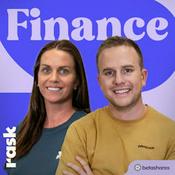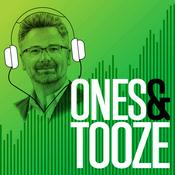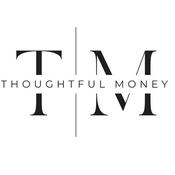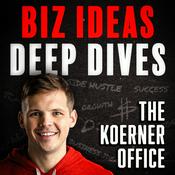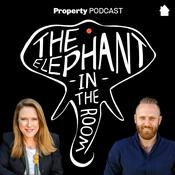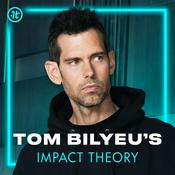"The Cognitive Revolution" | AI Builders, Researchers, and Live Player Analysis
Erik Torenberg, Nathan Labenz
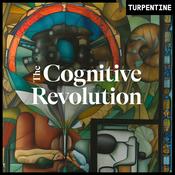
Latest episode
322 episodes
Mathematical Superintelligence: Harmonic's Vlad Tenev & Tudor Achim on IMO Gold & Theories of Everything
18/02/2026 | 1h 31 mins.Vlad Tenev and Tudor Achim from Harmonic explain how they built Aristotle, an AI system that reaches International Mathematical Olympiad gold-medal performance using formally verified Lean proofs. They unpack the architecture behind mathematical superintelligence, including Monte Carlo Tree Search, lemma guessing, and specialized geometry modules. The conversation explores how verifiable reasoning could harden mission-critical software, reshape mathematical practice, and lead to trustworthy superintelligent systems by 2030.
Use the Granola Recipe Nathan relies on to identify blind spots across conversations, AI research, and decisions: https://bit.ly/granolablindspot
Sponsors:
Claude:
Claude is the AI collaborator that understands your entire workflow, from drafting and research to coding and complex problem-solving. Start tackling bigger problems with Claude and unlock Claude Pro’s full capabilities at https://claude.ai/tcr
Framer:
Framer is an enterprise-grade website builder that lets business teams design, launch, and optimize their.com with AI-powered wireframing, real-time collaboration, and built-in analytics. Start building for free and get 30% off a Framer Pro annual plan at https://framer.com/cognitive
Blitzy:
Blitzy is the autonomous code generation platform that ingests millions of lines of code to accelerate enterprise software development by up to 5x with premium, spec-driven output. Schedule a strategy session with their AI solutions consultants at https://blitzy.com
Tasklet:
Tasklet is an AI agent that automates your work 24/7; just describe what you want in plain English and it gets the job done. Try it for free and use code COGREV for 50% off your first month at https://tasklet.ai
CHAPTERS:
(00:00) About the Episode
(04:58) Math as reasoning (Part 1)
(15:22) Sponsors: Claude | Framer
(18:51) Math as reasoning (Part 2)
(18:51) Inside the Lean language
(27:51) Lean intuition and MathLib (Part 1)
(34:08) Sponsors: Blitzy | Tasklet
(37:08) Lean intuition and MathLib (Part 2)
(38:47) Inside Aristotle's architecture
(48:33) Scope, boundaries, and applications
(54:37) Training, taste, and interpretability
(01:08:18) Formal math and software
(01:16:50) Limits, entropy, and roadmap
(01:25:24) 2030 vision and safety
(01:33:38) Outro
PRODUCED BY:
https://aipodcast.ingApproaching the AI Event Horizon? Part 2, w/ Abhi Mahajan, Helen Toner, Jeremie Harris, @8teAPi
14/02/2026 | 2h 22 mins.Abhi Mahajan (@owlposting) explains how AI is reshaping biology and medicine, including foundation models to predict cancer treatment response and why he’s both skeptical and optimistic about current results. Helen Toner unpacks CSET’s “When AI Builds AI” report and why automated AI R&D is a major source of strategic surprise. Jeremie Harris then explores our lack of control over superhuman AI systems, fragile US–China coordination, and how to maintain situational awareness in a rapidly shifting landscape.
Use the Granola Recipe Nathan relies on to identify blind spots across conversations, AI research, and decisions: https://bit.ly/granolablindspot
LINKS:
Abhi Mahajan's Owl Posting site
Heuristics for lab robotics article
Deep Research on Noetik AI
Sponsors:
GovAI:
GovAI was founded ten years ago on the belief that AI would end up transforming our world. Ten years later, the organization is at the forefront of trying to help decision-makers in government and industry navigate the transition to advanced AI. GovAI is now hiring Research Scholars (one-year positions for those transitioning into AI policy) and Research Fellows (longer-term roles for experienced researchers). Both roles offer significant freedom to pursue policy research, advise decision-makers, or launch new initiatives. Applications close 22 February 2026. Apply at: https://www.governance.ai/opportunities
Blitzy:
Blitzy is the autonomous code generation platform that ingests millions of lines of code to accelerate enterprise software development by up to 5x with premium, spec-driven output. Schedule a strategy session with their AI solutions consultants at https://blitzy.com
Tasklet:
Tasklet is an AI agent that automates your work 24/7; just describe what you want in plain English and it gets the job done. Try it for free and use code COGREV for 50% off your first month at https://tasklet.ai
Serval:
Serval uses AI-powered automations to cut IT help desk tickets by more than 50%, freeing your team from repetitive tasks like password resets and onboarding. Book your free pilot and guarantee 50% help desk automation by week four at https://serval.com/cognitive
Claude
Claude is the AI collaborator that understands your entire workflow, from drafting and research to coding and complex problem-solving. Start tackling bigger problems with Claude and unlock Claude Pro’s full capabilities at https://claude.ai/tcr
PRODUCED BY:
https://aipodcast.ingApproaching the AI Event Horizon? Part 1, w/ James Zou, Sam Hammond, Shoshannah Tekofsky, @8teAPi
13/02/2026 | 1h 32 mins.Part 1 of this live special dives into AI for Science, U.S. AI policy, and the behavior of AI agents in open-ended environments. James Zou explains how interpretability and virtual labs of AI agents can accelerate scientific discovery. Sam Hammond assesses the Biden administration’s AI policy, U.S.–Gulf AI deals, and the odds current AIs are conscious. Shoshannah Tekofsky shares insights from studying agent performance and emergent behavior in the AI Village.
Use the Granola Recipe Nathan relies on to identify blind spots across conversations, AI research, and decisions: https://bit.ly/granolablindspot
LINKS:
Model human wellness project doc
AI Village 2025 findings report
Sponsors:
GovAI:
GovAI was founded ten years ago on the belief that AI would end up transforming our world. Ten years later, the organization is at the forefront of trying to help decision-makers in government and industry navigate the transition to advanced AI. GovAI is now hiring Research Scholars (one-year positions for those transitioning into AI policy) and Research Fellows (longer-term roles for experienced researchers). Both roles offer significant freedom to pursue policy research, advise decision-makers, or launch new initiatives. Applications close 22 February 2026. Apply at: https://www.governance.ai/opportunities
Blitzy:
Blitzy is the autonomous code generation platform that ingests millions of lines of code to accelerate enterprise software development by up to 5x with premium, spec-driven output. Schedule a strategy session with their AI solutions consultants at https://blitzy.com
Tasklet:
Tasklet is an AI agent that automates your work 24/7; just describe what you want in plain English and it gets the job done. Try it for free and use code COGREV for 50% off your first month at https://tasklet.ai
Serval:
Serval uses AI-powered automations to cut IT help desk tickets by more than 50%, freeing your team from repetitive tasks like password resets and onboarding. Book your free pilot and guarantee 50% help desk automation by week four at https://serval.com/cognitive
Claude
Claude is the AI collaborator that understands your entire workflow, from drafting and research to coding and complex problem-solving. Start tackling bigger problems with Claude and unlock Claude Pro’s full capabilities at https://claude.ai/tcr
PRODUCED BY:
https://aipodcast.ingAGI-Pilled Cyber Defense: Automating Digital Forensics w/ Asymmetric Security Founder Alexis Carlier
08/02/2026 | 1h 16 mins.Alexis Carlier, founder of Asymmetric Security, explains how assuming AGI-level intelligent labor should transform cybersecurity from reactive triage to proactive, continuous digital forensics. He breaks down today’s threat landscape—from “spray and pray” cybercrime to nation-state IP theft and North Korean “remote workers.” The conversation explores Asymmetric’s AI agents for deep investigations, their services-first approach to business email compromise, and how specialized digital forensics may differentially accelerate defensive AI capabilities.
Use the Granola Recipe Nathan relies on to identify blind spots across conversations, AI research, and decisions: https://bit.ly/granolablindspot
Sponsors:
GovAI:
GovAI was founded ten years ago on the belief that AI would end up transforming our world. Ten years later, the organization is at the forefront of trying to help decision-makers in government and industry navigate the transition to advanced AI. GovAI is now hiring Research Scholars (one-year positions for those transitioning into AI policy) and Research Fellows (longer-term roles for experienced researchers). Both roles offer significant freedom to pursue policy research, advise decision-makers, or launch new initiatives. Applications close 22 February 2026. Apply at: https://www.governance.ai/opportunities
Blitzy:
Blitzy is the autonomous code generation platform that ingests millions of lines of code to accelerate enterprise software development by up to 5x with premium, spec-driven output. Schedule a strategy session with their AI solutions consultants at https://blitzy.com
Serval:
Serval uses AI-powered automations to cut IT help desk tickets by more than 50%, freeing your team from repetitive tasks like password resets and onboarding. Book your free pilot and guarantee 50% help desk automation by week four at https://serval.com/cognitive
Tasklet:
Tasklet is an AI agent that automates your work 24/7; just describe what you want in plain English and it gets the job done. Try it for free and use code COGREV for 50% off your first month at https://tasklet.ai
Claude
Claude is the AI collaborator that understands your entire workflow, from drafting and research to coding and complex problem-solving. Start tackling bigger problems with Claude and unlock Claude Pro’s full capabilities at https://claude.ai/tcr
CHAPTERS:
(00:00) About the Episode
(04:20) Defining AGI and jaggedness
(12:27) Modern cyber threat landscape (Part 1)
(19:10) Sponsors: GovAI | Blitzy
(22:17) Modern cyber threat landscape (Part 2)
(29:58) AI-powered cyber defense (Part 1)
(33:31) Sponsors: Serval | Tasklet
(36:20) AI-powered cyber defense (Part 2)
(42:20) Inside digital forensics workflows
(51:52) Bootstrapping AI cyber defense
(59:17) Shaping the capability frontier
(01:08:44) Future of automated forensics
(01:17:59) Outro
PRODUCED BY:
https://aipodcast.ingInfinite Code Context: AI Coding at Enterprise Scale w/ Blitzy CEO Brian Elliott & CTO Sid Pardeshi
05/02/2026 | 1h 56 mins.Blitzy founders Brian and Sid break down how their “infinite code context” system lets AI autonomously complete over 80% of major enterprise software projects in days. They dive into their dynamic agent architecture, how they choose and cross-check different models, and why they prioritize advances in AI memory over fine-tuning. The conversation also covers their 20¢/line pricing model, the path to 99%+ autonomous project completion, and what this all means for the future software engineering job market.
Sponsors:
Blitzy:
Blitzy is the autonomous code generation platform that ingests millions of lines of code to accelerate enterprise software development by up to 5x with premium, spec-driven output. Schedule a strategy session with their AI solutions consultants at https://blitzy.com
Tasklet:
Tasklet is an AI agent that automates your work 24/7; just describe what you want in plain English and it gets the job done. Try it for free and use code COGREV for 50% off your first month at https://tasklet.ai
Serval:
Serval uses AI-powered automations to cut IT help desk tickets by more than 50%, freeing your team from repetitive tasks like password resets and onboarding. Book your free pilot and guarantee 50% help desk automation by week four at https://serval.com/cognitive
Claude
Claude is the AI collaborator that understands your entire workflow, from drafting and research to coding and complex problem-solving. Start tackling bigger problems with Claude and unlock Claude Pro’s full capabilities at https://claude.ai/tcr
CHAPTERS:
(00:00) About the Episode
(03:02) AGI effects without AGI
(07:07) Domain-specific context engineering
(16:54) Dynamic harness and evals (Part 1)
(17:00) Sponsors: Blitzy | Tasklet
(20:00) Dynamic harness and evals (Part 2)
(30:42) Graphs, RAG, and memory (Part 1)
(30:49) Sponsor: Serval
(32:26) Graphs, RAG, and memory (Part 2)
(41:17) Model zoo and memory
(50:07) Planning, scaling, and parallelism
(56:13) Pricing, onboarding, and autonomy
(01:04:24) Closing the last 20%
(01:12:34) Strange behaviors and judges
(01:22:23) Reasoning budgets and autonomy
(01:33:36) Fine-tuning, benchmarks, and training
(01:42:31) Securing AI-generated code
(01:49:52) Future of software work
(01:57:05) Outro
PRODUCED BY:
https://aipodcast.ing
SOCIAL LINKS:
Website: https://www.cognitiverevolution.ai
Twitter (Podcast): https://x.com/cogrev_podcast
Twitter (Nathan): https://x.com/labenz
LinkedIn: https://linkedin.com/in/nathanlabenz/
Youtube: https://youtube.com/@CognitiveRevolutionPodcast
Apple: https://podcasts.apple.com/de/podcast/the-cognitive-revolution-ai-builders-researchers-and/id1669813431
Spotify: https://open.spotify.com/show/6yHyok3M3BjqzR0VB5MSyk
More Business podcasts
Trending Business podcasts
About "The Cognitive Revolution" | AI Builders, Researchers, and Live Player Analysis
A biweekly podcast where hosts Nathan Labenz and Erik Torenberg interview the builders on the edge of AI and explore the dramatic shift it will unlock in the coming years.
The Cognitive Revolution is part of the Turpentine podcast network. To learn more: turpentine.co
Podcast websiteListen to "The Cognitive Revolution" | AI Builders, Researchers, and Live Player Analysis, Prof G Markets and many other podcasts from around the world with the radio.net app

Get the free radio.net app
- Stations and podcasts to bookmark
- Stream via Wi-Fi or Bluetooth
- Supports Carplay & Android Auto
- Many other app features
Get the free radio.net app
- Stations and podcasts to bookmark
- Stream via Wi-Fi or Bluetooth
- Supports Carplay & Android Auto
- Many other app features


"The Cognitive Revolution" | AI Builders, Researchers, and Live Player Analysis
Scan code,
download the app,
start listening.
download the app,
start listening.



